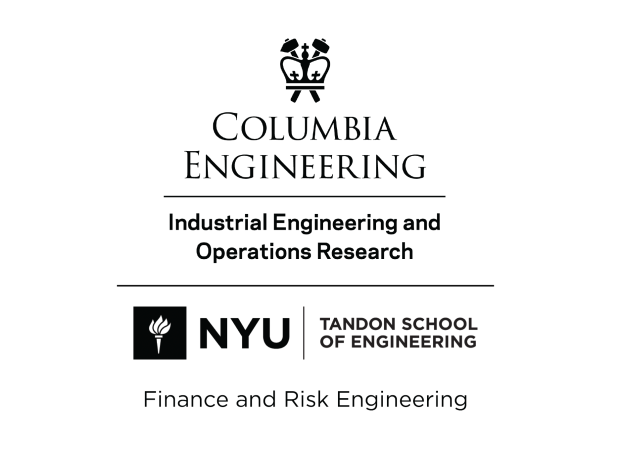Columbia & NYU Financial Engineering Colloquium: Julien Guyon & Marcel Nutz

This event will be held at Columbia University. Registration is required.
Marcel Nutz: 4 pm ET
Julien Guyon: 5 pm ET
Julien Guyon
Professor of Applied Mathematics at Ecole des Ponts ParisTech
Title
Volatility Is (Mostly) Path-Dependent
Abstract
We learn from data that volatility is mostly path-dependent: up to 90% of the variance of the implied volatility of equity indexes is explained endogenously by past index returns, and up to 65% for (noisy estimates of) future daily realized volatility. The path-dependency that we uncover is remarkably simple: a linear combination of a weighted sum of past daily returns and the square root of a weighted sum of past daily squared returns with different time-shifted power-law weights capturing both short and long memory. This simple model, which is homogeneous in volatility, is shown to consistently outperform existing models across equity indexes and train/test sets for both implied and realized volatility. It suggests a simple continuous-time path-dependent volatility (PDV) model that may be fed historical or risk-neutral parameters. The weights can be approximated by superpositions of exponential kernels to produce Markovian models. In particular, we propose a 4-factor Markovian PDV model which captures all the important stylized facts of volatility, produces very realistic price and (rough-like) volatility paths, and jointly fits SPX and VIX smiles remarkably well. We thus show that a continuous-time Markovian parametric stochastic volatility (actually, PDV) model can practically solve the joint SPX/VIX smile calibration problem. This is joint work with Jordan Lekeufack.
Bio
Julien Guyon is a professor of Applied Mathematics at Ecole des Ponts ParisTech where he holds the BNP Paribas Chair Futures of Quantitative Finance. He is also a Visiting Associate Professor in the Department of Finance and Risk Engineering at NYU Tandon, and an Adjunct Professor in the Departments of Mathematics at Columbia University and Baruch College, CUNY. Before joining Ecole des Ponts, Julien worked in the financial industry for 16 years, first in the Global Markets Quantitative Research team at Societe Generale in Paris (2006-2012), then as a senior quantitative analyst in the Quantitative Research group at Bloomberg L.P., New York (2012-2022). Julien was also an adjunct professor at the Courant Institute of Mathematical Sciences, NYU, from 2015 to 2022; and previously at Universite Paris Diderot and Ecole des Ponts. Julien serves as an Associate Editor of Finance & Stochastics, SIAM Journal on Financial Mathematics, Quantitative Finance, and Journal of Dynamics and Games. He is also a Louis Bachelier Fellow.
Julien co-authored the book Nonlinear Option Pricing (Chapman & Hall, 2014) with Pierre Henry-Labordere. He has published more than 25 articles in peer-reviewed journals and is a regular speaker at international conferences, both academic and professional. His main research interests include volatility and correlation modeling, option pricing, optimal transport, and numerical probabilistic methods.
A big soccer fan, Julien has also published articles on fairness in sports both in academic journals and in top-tier newspapers including The New York Times, The Times, Le Monde, and El Pais. Some of his suggestions for draws and tournament design have been adopted by FIFA and UEFA, including a new, fairer draw method for the FIFA World Cup (since 2018); a fairer format for the 2026 FIFA World Cup (adopted in March 2023); and a new knockout bracket for the UEFA Euro (since 2020). His paper "Risk of collusion: Will groups of 3 ruin the FIFA World Cup?" won the 2nd prize at the 2021 MIT Sloan Sports Analytics Conference, the biggest sports analytics event in the world.
Marcel Nutz
Professor, Statistics and Mathematics Departments at Columbia University

Title
Unwinding Stochastic Order Flow
Abstract
We study how to unwind stochastic order flow with minimal transaction costs. Stochastic order flow arises, e.g., in the central risk book (CRB), a centralized trading desk that aggregates order flows within a financial institution. The desk can warehouse in-flow orders, ideally netting them against subsequent opposite orders (internalization), or route them to the market (externalization) and incur costs related to price impact and bid-ask spread. We model and solve this problem for a general class of in-flow processes, enabling us to study in detail how in-flow characteristics affect optimal strategy and core trading metrics. Our model allows for an analytic solution in semi-closed form and is readily implementable numerically. Compared with a standard execution problem where the order size is known upfront, the unwind strategy exhibits an additive adjustment for projected future in flows. Its sign depends on the autocorrelation of orders; only truth-telling (martingale) flow is unwound myopically. (Joint work with Kevin Webster and Long Zhao.)
Bio
Marcel is a professor in the Statistics and Mathematics departments at Columbia University. His research focuses on mathematical finance and optimal transport. Marcel was named IMS Fellow, Alfred P. Sloan Fellow, and Columbia-Ecole Polytechnique Alliance Professor, and serves on various editorial boards.


